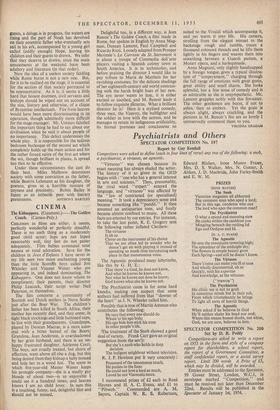CINEMA
The Kidnappers. (Gaumont.)—The Golden Coach. (Cameo-Poly.)
CHILDREN in films are either, it seems, perfectly wonderful or perfectly dreadful. There is no such thing as a moderately good child actor; lisps are not lisped reasonably well, tiny feet do not patter adequately. Film babies command total nausea or total adoration. Save for the children in Jeux d'Enfants I have never in my life seen two more enchanting young than the little Scottish boys called Jon Whiteley and Vincent Winter who are appearing in, and indeed dominating, The Kidnappers. One does not know whom to compliment; their parents, their director Philip Leacock, their script writer Neil Paterson, or themselves.
The film concerns' a community of Scottish and 'Dutch settlers in Nova Scotia just after the Boer War. The children's father has been killed in South Africa, their mother has recently died, and they come, in tight black stockings and little buttoned caps, to live with their grandparents. Grandpapa, played by Duncan Macrae, is a stern auto- crat with a bitter hatred of the Boers; Grandma, Jean Anderson, is overshadowed by her grim husband, and there is an un- happy frustrated daughter, Adrienne Corri. The boys, not cruelly treated, but shorn of affection, want above all else a dog, but this being denied them they kidnap a baby instead and hide her in a wood hut. The scene in which five-year-old Master Winter keeps his protegee company—she is a madly gay blonde of about two—is so enjoyable I could see it a hundred times, and heaven knows I am no child lover. In sum this is a touching, funny, sad, delightful filet and should not be missed. Delightful too, in a different way, is Jean Renoir's The Golden Coach, a film made in Rome, but spoken in English by Anna Mag- nani, Duncan Lamont, Paul Campbell and Ricardo Rioli. Loosely adapted from Prosper Merimee 's La Carrosse du St. Sacrement it is about a troupe of Commedia dell'arte players visiting a Spanish colony town in South America. It is in technicolor, and before praising the director I would like to pay tribute to Maria de Mattheis for her ravishing costumes, for the delicate shadings of her eighteenth-century old world contrast- ing with the harsh bright hues of her new. The eye never wants to laze, it is either excited or soothed, and M. Renoir leads it to follow exquisitetratterns. What a brilliant director he is! Here is a stylised comedy, three men, the Viceroy, the bullfighter and the soldier in love with the actress, and he manages to retain its indigenous artificiality, its formal premises and conclusions so
suited to the Vivaldi which accompanies it, and yet warm it into life. His camera, strolling from the elegant minuet to the backstage rough and tumble, traces a thousand coloured threads and he lifts them lightly in his fingers and weaves them into something between a Guardi picture, a Mozart opera, and a harlequinade.
Anna Magnani, only slightly handicapped by a foreign tongue, gives a typical illustra- tion of "temperament," charging through the full range of emotions with great gusto, great ability and small charm. She looks splendid, has a fine sense of comedy and is as admirable as she is unsympathetic. Mr. Lamont grapples nobly with this fire-eater. The other gentlemen are burnt, if not to ashes, then to embers. Yet the grate is always alight, always crackling, and the pictures in M. Renoir's fire are so lovely I unreservedly commend them to you.
VIRGINIA GRAHAM


































 Previous page
Previous page